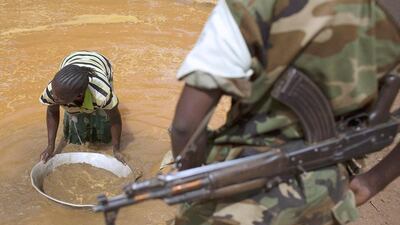At the giant Ndassima gold mine carved into a forested hilltop in the Central African Republic, sweat-soaked labourers toil beneath the gaze of gunmen to produce some 15 kilograms of gold a month - worth roughly US$350,000 on the local market, or double that in the outlawed international trade.
Weighing gold on a balance in a hut at the foot of the mine, Jimmy Adoum says buyers are scarce but some pay their way past rebel checkpoints to carry gold to Bangui and east to Cameroon.
Further north, diamond fields around Bria and Sam Ouandja provide revenue for rebels, who extract protection money and sell diamonds to dealers in Sudan and Chad, experts say. From there, the gems are trafficked to Antwerp, Dubai or India.
The mine was overrun by the mainly Muslim Seleka rebels more than year ago. It now forms part of an illicit economy driving sectarian conflict in one of Africa’s most unstable countries.
Thousands of people have died and more than a million fled their homes in CAR amid the violence between the Muslim rebels and the anti-balaka militia that oppose them.
“Commanders on both sides are profiteering from this conflict. Both the anti-balaka militia and Seleka are involved in gold and diamonds,” says Kasper Agger, a field researcher for the Enough Project, a Washington-based think tank. “If we are going to make peace, we need to offer them an economic alternative.”
Before the clashes, CAR ranked as the world’s 12th largest diamond exporter. Thousands of artisanal miners produced more than 300,000 carats a year from thin alluvial deposits.
Now much of the fiercest fighting centres on these deposits, especially in the west. In the mining town of Boda, nestled in forests 100 kilometres west of the capital Bangui, the anti-balaka militia have besieged thousands of Muslims in the market district.
French troops, their armoured personnel carriers aligned on an escarpment overlooking the town, now keep the two sides apart. Opposite the Muslim enclave stand ruins of Christian homes destroyed in fighting after Seleka withdrew in January.
Each side accuses the other of starting the clashes. Christians have seized Muslims’ mining equipment and cattle from nearby pastures. Some who venture from the Muslim enclave have been killed by militia, their bodies dumped in the river.
“If the Muslims stay there 40 years, we’ll wait for them. We want to kill them,” said Nicaise Wilikondi, 45, a former teacher who lives in a camp for displaced Christians.
Like elsewhere in CAR, in Boda it was Muslim middlemen who controlled the diamond trade and reaped its profits, while most of the poorly paid mine labourers were Christians, fuelling sectarian resentment.
Cherif Dahirou, Boda’s main Muslim diamond trader, said the Christian militia had seized the nearby artisanal pits, but he refused to leave the town where he has lived for 38 years.
“This isn’t about religion: it’s jealousy,” he said under an awning in the grounds of his large house in Boda, in the Muslim enclave. Originally from Chad, he spoke in Arabic, not the local Sango language: “I know the anti-balaka commanders, Romeo and Malou: they used to work the mines.”
In an attempt to prevent “blood diamonds” from funding this conflict, the Kimberley Process – a group of 81 countries, including all the major diamond producers – imposed an export ban on raw gems from CAR last year. Local trading houses such as Sodiam and Badica are still buying gems to stockpile until the ban is lifted.
The transitional government of the CAR president, Catherine Samba Panza, is trying to enforce a “traceability” scheme to show that diamonds are not mined in rebel territory. With only a handful of officials in its anti-smuggling task force, her cash-strapped government has little prospect of curbing the traffic in gemstones.
“Everyone is still buying. Some people take it to Chad, then it goes to Dubai,” said Saliou Issoufa, whose family works in the trade in Bambari. He said some Seleka leaders were directly involved in the trade – something corroborated by a UN report.
Seleka’s two main factions have for years vied to control the diamond mines in the remote north-east. The Union of Democratic Forces for Unity, made up of fighters from the Gula tribe, controlled Bria. The Convention of Patriots for Justice and Peace, grouping Runga fighters, seized mines at Ndele.
In a recent report, the think tank International Crisis Group called for mines to be occupied by international peacekeepers.
Yet diplomats and Seleka insiders say the rebel leaders will not hand over control. “Bambari and Bria are the financing of Seleka. They will never let them go,” said one senior diplomat.
At the lip of the Ndassima mine, bare-chested labourers bristled at the thought of foreign interference in their business.
“We don’t want international forces here,” said one youth covered in glittering yellow mud. “They’ll take the mine from us.”
business@thenational.ae
Follow The National's Business section on Twitter

